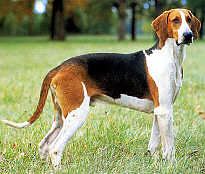Anglo-Français and Français (hound)
Anglo-Français and Français (hound) are terms that refer to specific breeds of hound dogs that have their origins in France. These breeds are known for their hunting capabilities, particularly in the pursuit of game such as deer and boar. The Anglo-Français and Français hounds are distinguished by their keen sense of smell, endurance, and ability to work in a pack.
History[edit | edit source]
The development of the Anglo-Français and Français breeds was influenced by the desire to create hounds that combined the best qualities of British and French hunting dogs. This breeding effort aimed to produce dogs that were capable of hunting in the diverse terrains of France, from dense forests to open fields.
Anglo-Français[edit | edit source]
The Anglo-Français hounds are a result of crossbreeding between English foxhounds and various French hound breeds. This crossbreeding was intended to enhance the breed's hunting abilities, particularly in terms of speed, stamina, and olfactory acuity. The Anglo-Français is further divided into several types, including the Anglo-Français de Petite Vénerie, which is smaller and used for hunting smaller game.
Français[edit | edit source]
The Français hounds, on the other hand, are purely French breeds that have not been significantly influenced by English bloodlines. These include the Français Blanc et Noir, Français Blanc et Orange, and Français Tricolore, each distinguished by their unique coat patterns and colors. These breeds are known for their pure breeding lines, maintained to preserve their traditional hunting capabilities and physical characteristics.
Characteristics[edit | edit source]
Anglo-Français and Français hounds are medium to large-sized dogs with strong, muscular builds. They possess long legs, deep chests, and powerful necks, enabling them to traverse rough terrains with ease. Their coats are short and dense, providing protection against underbrush and weather conditions.
Temperament[edit | edit source]
These hounds are known for their loyalty, intelligence, and gentle demeanor. They are highly social animals that thrive in pack environments, whether with other dogs or within a family setting. Despite their hunting instincts, they can be affectionate and good-natured companions.
Hunting[edit | edit source]
Traditionally, the Anglo-Français and Français hounds have been used for hunting large game, such as deer and wild boar. They are scent hounds, relying on their exceptional sense of smell to track game over long distances. These dogs are also known for their loud baying, which is used to communicate with hunters and other dogs during the hunt.
Care and Maintenance[edit | edit source]
Due to their high energy levels and need for regular exercise, Anglo-Français and Français hounds require ample space to run and play. They are best suited to rural or suburban environments where they can explore and exercise freely. Regular grooming is necessary to maintain their coat's condition, and they benefit from engagement in activities that stimulate their mental and physical well-being.
Conclusion[edit | edit source]
The Anglo-Français and Français hounds are esteemed members of the scent hound family, prized for their hunting prowess and companionable nature. Their rich history and distinctive characteristics make them fascinating subjects for those interested in canine breeds and their roles in human society.
Navigation: Wellness - Encyclopedia - Health topics - Disease Index - Drugs - World Directory - Gray's Anatomy - Keto diet - Recipes
Search WikiMD
Ad.Tired of being Overweight? Try W8MD's physician weight loss program.
Semaglutide (Ozempic / Wegovy and Tirzepatide (Mounjaro / Zepbound) available.
Advertise on WikiMD
WikiMD is not a substitute for professional medical advice. See full disclaimer.
Credits:Most images are courtesy of Wikimedia commons, and templates Wikipedia, licensed under CC BY SA or similar.Contributors: Prab R. Tumpati, MD

